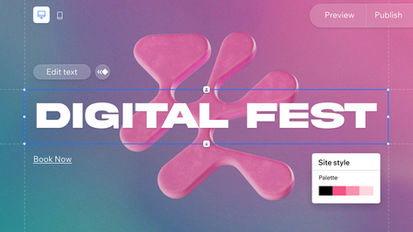Quick Website and App Development Guide
How Website and App Development Works
Website and App Development
In today’s digital age, having a strong online presence is crucial for businesses and individuals alike. One of the most effective ways to showcase your work and attract potential clients is through a website portfolio. However, creating a website portfolio can be a daunting task, especially if you don’t have any design or coding experience.

Website and App Development Challenges
Website and App Development
What is a web hosting provider?
A web hosting provider is a company that offers the technology and services needed for a website to be accessible on the internet. When you sign up for web hosting services, the provider allocates space on a server for your website’s files and ensures that your website is up and running smoothly 24/7.
Why is choosing the right web hosting provider important?
Selecting the right web hosting provider is essential for the success of your website for several reasons:
1. Reliability: A reliable web hosting provider ensures that your website is always accessible to users. Downtime can have a negative impact on your website’s traffic and reputation, so it is crucial to choose a provider with a high uptime guarantee.
2. Speed: The speed at which your website loads can affect user experience and search engine rankings. A good web hosting provider will offer fast server speeds and optimal performance for your website.
3. Customer support: Having reliable customer support is crucial in case you encounter technical issues or need assistance with your website. A good web hosting provider should offer 24/7 customer support to address any problems quickly.
4. Security: Ensuring the security of your website and customer data is paramount. A reputable web hosting provider will offer robust security features such as SSL certificates, firewalls, and regular backups to protect your website from cyber threats.
What factors should you consider when choosing a web hosting provider?
When selecting a web hosting provider, there are several key factors to consider to ensure that you are making the right choice for your website:
1. Types of hosting: There are various types of hosting services available, including shared hosting, VPS hosting, dedicated hosting, and cloud hosting. Choose a hosting type that aligns with your website’s needs and traffic volume.
2. Uptime guarantee: Look for a web hosting provider that offers a high uptime guarantee to ensure that your website is always accessible to users. A 99.9% uptime guarantee is considered industry standard.
3. Server speed: The speed at which your website loads can impact user experience and search engine rankings. Choose a web hosting provider with fast server speeds to ensure optimal performance for your website.
4. Customer support: Having reliable customer support is crucial in case you encounter technical issues or need assistance with your website. Look for a web hosting provider that offers 24/7 customer support via phone, email, or live chat.
5. Security features: Ensure that the web hosting provider offers robust security features such as SSL certificates, firewalls, and regular backups to protect your website from cyber threats.
6. Scalability: Consider whether the web hosting provider offers scalability options in case your website grows and requires additional resources in the future.
7. Pricing: Compare pricing plans and features offered by different web hosting providers to find the best value for your budget. Look for hidden fees and consider any additional costs for domain registration, SSL certificates, or data backups.
1. Wix
Wix is a popular website builder that offers a user-friendly interface and a wide range of design templates to choose from. With Wix, small businesses can easily create a professional-looking website without any coding skills. The drag-and-drop editor makes it easy to customize your site to fit your brand and business needs. In addition, Wix offers a free plan that includes Wix branding and a subdomain, making it a great option for small businesses on a tight budget.
2. WordPress
WordPress is one of the most popular content management systems (CMS) in the world, powering millions of websites. While WordPress is known for its flexibility and customization options, it can be a bit intimidating for beginners. However, WordPress.com offers a free plan that allows users to create a basic website with limited customization options. For small businesses looking for more control and flexibility, WordPress.org is a better option, but it requires a hosting plan.
3. Weebly
Weebly is another user-friendly website builder that is perfect for small businesses. With Weebly, users can choose from a wide range of design templates and easily customize their website with drag-and-drop tools. Weebly also offers e-commerce features, making it a great option for small businesses looking to sell products online. While Weebly’s free plan includes Weebly branding and a subdomain, users can upgrade to a paid plan for more features and customization options.
4. Squarespace
Squarespace is a sleek and modern website builder that is perfect for small businesses looking to create a visually stunning website. With Squarespace, users can choose from a range of design templates and customize their site with a drag-and-drop editor. While Squarespace does not offer a free plan, they do offer a 14-day free trial, allowing users to test out the platform before committing to a paid plan.
5. Shopify
Shopify is a popular e-commerce platform that allows small businesses to create an online store. While Shopify is primarily geared towards e-commerce, they also offer a website builder that allows users to create a basic website for their business. With Shopify, users can choose from a range of design templates and customize their site with drag-and-drop tools. While Shopify does not offer a free plan, they do offer a 14-day free trial, allowing users to test out the platform before committing to a paid plan.

Website and App Development Explained
Website and App Development
In conclusion, the cost of web design can vary widely depending on a number of factors including complexity, customization, platform, and ongoing maintenance. By understanding the factors that influence cost and working with a reputable web design agency, you can ensure that you get the best value for your money and create a website that meets your business objectives. Remember that your website is an investment in your business’s future, so it’s worth investing in quality design and functionality to help your business stand out online.

